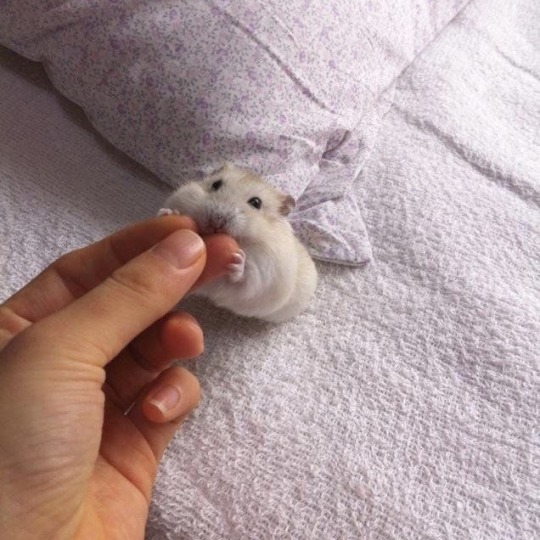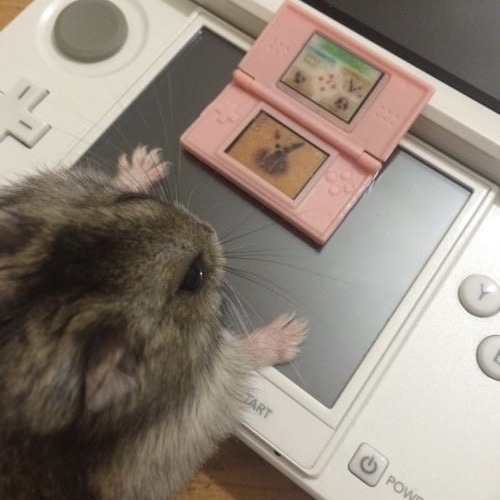Hello! This is my studyblr! Meant for study tips, language facts, and for passionate learning! Send me an ask! 大家好, 我叫白可盈。我学习中文! 我喜欢学习外语!
Last active 60 minutes ago
Don't wanna be here? Send us removal request.
Text

BUON NATALE ! = MERRY CHRISTMAS !
L'albero di Natale = Christmas tree La calza (della Befana)* = Christmas/Epiphany stocking La sfera di vetro / La sfera di Natale = Christmas (snow) globe Il vischio = mistletoe L'omino di neve = snowman Il dono / il regalo = gift La candela = candle L'elfo = elf La renna / Rudolph = the reindeer / Rudolph Babbo Natale = Santa Claus La ghirlanda = garland L'omino di pan di zenzero = gingerbread man Le lucine di Natale / Le luminarie = Christmas' lights La letterina per Babbo Natale / La letterina di Natale = Santa's / Christmas' wishlist (where kids write their gifts' list)
*(we use it mostly for Epiphany. At least, for what I know)
119 notes
·
View notes
Text
Superlinguo Linguist Job Interviews full list
The Linguist Jobs Interview series has been running since May 2015. There are now over 60 interviews, with people who studied linguistics - be it a single undergraduate subject or a full PhD - and then gone on to careers outside of academia.
Although I ask the same questions each time, I get very different answers. For some people, linguistics is directly applicable to their daily work, while others find that the general skills they learnt can transfer to other careers.
I update this list at least once a year. For newer interviews, you can browse the Linguistics Jobs tag on the blog!
The full list of Linguistics Job Interviews (to May 2021):
Interview with a Legislative Drafter
Interview with a Stay-at-home Mom and Twitch Streamer
Interview with a Peer Review Program Manager
Interview with an Associate at the Children’s Center for Communication, Beverly School for the Deaf
Interview with a Metadata Specialist and Genealogist
Interview with a Developer Advocate
Interview with an ESL teacher, coach and podcaster
Interview with a Juris Doctor (Master of Laws) student
Interview with the Director of Education and Professional Practice at the American Anthropological Association
Interview with a Research Coordinator, Speech Pathologist
Interview with a Freelance Writer!
Interview with a Dance Instructor and Stay-at-Home Mom
Interview with a Transcriptionist
Interview with an Exhibition Content Manager
Interview with a Marketing Content Specialist
Interview with a Software Engineer
Interview with a Product Manager
Interview with a Communications Specialist
Interview with a Learning Scientist
Interview with an Internet Linguist
Interview with a Lexicographer
Interview with a School Linguist
Interview with a Journalist
Interview with a PR Consultant
Interview with an Agency Owner & Executive Editor
Interview with a Freelance Editor, Writer and Trainer
Interview with a Language Creator
Interview with a Translator and Business Owner
Interview with a Standards Engineer
Interview with a Conductor
Interview with an Accent Coach
Interview with two Communications Professionals
Interview with a University Course Coordinator
Interview with a Think Tank Researcher
Interview with a Museum Curator
Interview with a Communications Consultant
Interview with a Linguistic Project Manager at a Language Tech Company
Interview with a Data Scientist
Interview with a Librarian
Interview with a Text Analyst
Interview with a User Experience (UX) Researcher
Interview with a Study Abroad Facilitator
Interview with The Career Linguist
Interview with a local radio Digital Managing Editor
Interview with a Senior Content Project Manager at Transparent Language
Interview with a Freelance Translator and Editor
Interview with an Apprentice Mechanic
Interview with an Educational Development Lecturer (and Linguistic Consultant)
Interview with a Client Services Manager
Interview with an English Foreign Language Teacher
Interview with a Speech Pathologist
Interview with a Computational Linguist
Interview with a Tour Company Director
Interview with a Copywriter and Brand Strategist (and Fiction Author)
Interview with a Language Revitalisation Program Director
Interview with a Media Language Researcher
Interview with an Editor and Copywriter
Interview with a Humanitarian Aid Worker
Interview with a High School Teacher`
Interview with an Interpreter
Interview with a Journalist
Interview with a Data Analyst
2K notes
·
View notes
Text
Hey did you know I keep a google drive folder with linguistics and language books that I try to update regularly
220K notes
·
View notes
Text
Creating a Routine When You Don't Have Any Daily Structure
So I know that when I have appointments or classes to hold me accountable, I create a daily/weekly routine in order to help myself get everything done. It works every time and I get things done. However, the moment I don't have classes anymore, when I don't have to do anything.... I don't do anything. I can't get anything done unless I'm told I have to.
This has endlessly frustrated me, because I want to be able to accomplish something on my own terms. I also run out of energy (or "spoons") easily since I have to work around adhd, chronic pain, and other issues.
So what's the solution? How do you become productive on your own terms when you're stuck with executive function issues and addicted to short term satisfaction?
A routine.
I used to hate them, because I could never actually stick to them. I found them boring and a waste of time. But there's a way to do it right.
A Five Step Process to Creating a Proper Routine
1. Sit down and plan it out.
With this, get a piece of paper and a pen or create a document on the computer you can print out. (I know handwriting hurts a lot with carpal tunnel/arthritis). Firstly, we need to be realistic with how much you can get done in a day. How many things can you do comfortably without pushing yourself too hard. Remember, you're doing this during a rest period, meaning you don't want to burn out. If that means it's 5 things such as wake up, shower, dress, cook/eat, and one other thing you want to do, then plan for that. For me, I already know I have enough energy in the day to do all of my daily hygiene and needs and have energy to do more things. So this is my outline:
A. Get ready
B. Write at least one sentence in novel
C. Spend one hour studying target language
D. Clean room
E. Spend time reading/knitting
F. Allow time to meditate or journal mood
And that's my goals for a regular rest day.
2. Prioritize every daily goal
You may end up with other things you have to do during a rest day. That doesn't mean you push yourself to do all of those goals on top of whatever else you have to do. It means that you have to let something else fall by the wayside for a day.
Pick and choose what you find crucial to do in a day, and what you're okay with allowing to skip during a busy day. Then, list it by priority. For me, it looks like this:
A. Get ready
B. Clean room
C. Spend time reading/knitting
D. Allow time to meditate or journal mood
E. Spend one hour studying target language
F. Write at least one sentence in novel
I know that if I was busy during a portion of the day, I'm going to want to prioritize tasks that help center and relax me rather than mentally and physically draining ones. I also care about cleanliness and feeling ready to face the day, so the first two are non-negotiable to me.
3. Organize yourself accordingly
What I mean by this, is that you have to execute this correctly to push yourself to actually do it. This means putting that list somewhere you will struggle to ignore it, and if you have adhd like me, I recommend changing it's position once a week, or it will begin to fade into the background and you will forget about it.
This also means organizing supplies for any hobby or task you will be tackling. I recommend keeping these supplies in a nice stack, pile, or box/jar (that's see through) if you have adhd or somewhere easily accessible if you have chronic pain. For me, I keep trays in the area where that task usually takes place so I can see it, and it doesn't physically drain me to get it.
Lastly, this means recognizing what is getting in your way. What is your biggest time waster? For me, it's a mix of tiktok, ao3, and YouTube. But they all have one thing in common. The internet, and my phone/laptop. I open my phone every morning and waste an hour on tiktok because I wake up in pain and freezing. I open my laptop at lunch and waste time watching YouTube while eating, and before I know it, it's 6 pm! You have to identify what wastes your time and how you are going to minimize that issue. In fact, this was so hard for me that my next step is about how to help combat this.
4. Set reminders/alarms
Setting a phone alarm might seem counter productive to staying off of your phone, but it actually really helps. As someone with adhd, I struggle to stop and start doing tasks. I have to start a new task at the right time (ex. 2:00, 3:15, 4:30) usually at 15 minute or half hour intervals and if I miss it, I procrastinate until the next "correct" interval. This is DUMB but I can't stop my brain from thinking this way so I have to accommodate for that.
So, here's what I do.
Let's say my plan is to stop being on the computer at 2:00 pm everyday. This is realistic for me since I wake up at 10:00 and eat around 12:30. I will then set an alarm for 1:50 pm, because that will warn me that in 10 minutes, I have to change tasks, so I can prepare myself for it. I set another alarm for 1:57, just to help myself stay reminded and give myself time to properly wrap up whatever I was doing online. Set my last alarm for 2:00 pm and make sure to close the laptop as soon as I hear the alarm, before dismissing it.
I'm now free to change mindsets to whatever priority I have next on my list, so I make sure to clean my area, and set up for the next task, such as language learning.
These alarms can be really helpful to help you keep track of time, it forces you to ground yourself in the present moment and make sure you can't lose track of time. However, I understand that people with sensory processing issues may not like a harsh alarm sound, or anything loud.
The alarm can be a pleasant sound that will get your attention as well. I like birds chirping or Chopin as an alarm sound.
5. Be forgiving
You won't immediately make this work. You won't just magically wake up and perfect this routine and become super productive. This is a guideline to help make it easier to begin.
There are plenty of other tips and tricks to help focus and get things done, but this is to help create a Routine. This will work best if you wake up and go to bed at relatively the same time everyday. Which for people with adhd, that can be difficult. If you want more tips on sleep and adhd let me know, or send me an ask.
Don't be angry and give up if it doesn't go perfectly. Just keep trying. Don't expect perfection, expect mediocrity. Mediocrity is fine, or really, great in a routine. It's supposed to be a little flexible, you're supposed to fuck it up sometimes. A guideline doesn't understand exactly how you feel that day, how tired you are, or how stressed you are. Be nice to yourself and just give it a try!
Good luck!!
#studying hacks#studyblr#adhd tips#actually adhd#life hacks#studying tips#langblr#language learning#routine#neurodivergent
288 notes
·
View notes
Text
Studyblr
I haven't done much with this blog since I've created it, but I want that to change. In the past I used it only as an archive of useful language learning posts, but I don't feel like that has actually helped me in the past year. I've always been a knowledge-oriented person, and by that I mean I inevitably become infatuated with learning anything. Even in classes I hate I still love learning the content, because learning is my one true passion.
However, as someone with incredibly pervasive adhd, I have always found it difficult to remain consistently organized and motivated. In the past, adrenaline is what aided my work ethic, not true discipline, and that has only begun to somewhat change this past semester. With the introduction of online classes, I had to actually develop real strategies to hold myself accountable and quit procrastinating. It wasn't perfect, but many of these strategies really helped and I am ready to move to the next step.
With that in mind, I felt that using this normally dormant blog to my advantage would be crucial to this step. I'm going to bring it out of its habitual hibernation and begin to use it hopefully daily.
My strategy is to use this blog to be helpful towards myself and hopefully others. I've developed many tactics to combat adhd and to help learning and studying. As Covid-19 seems to be getting worse in many areas, many upcoming semesters will be online again, mine and my girlfriend's included. Knowing that, I assume many people might benefit from tips and tricks to help study or hold oneself accountable while learning online. I want to give advice to anyone who could benefit from it, as well as become more active in the studyblr community.
Here's to turning over a new leaf! If you liked this post and actually read to the end, thanks! Consider following my blog if:
You're interested based off of this post
You're learning Mandarin Chinese (I am too!)
You have adhd and would like study tips
You're learning online and would like study tips
You like learning languages and would like facts/tips about language acquisition
You have adhd, spd, dyslexia, messy handwriting/carpal tunnel/arthritis, and would like helpful facts or tips about these conditions, and how to successfully study with said conditions (I have all of these issues and have made strategies to myself with all of them)
You just want to interact with another studyblr blog!
Also, if anything piqued your interest, feel free to send me an ask about any of these subjects!
12 notes
·
View notes
Text
New Year Goals 2021
Mental health Goals
- Start Journaling mental health and moods
- Start Documenting Therapy Sessions
- Start allowing time to reflect like meditation at least once a week
Language Goals
- Work on Chinese every other day
- Work on Target Language on other day
Hobby Goals
- Allow Myself to work on a small Hobby and not have to finish a project in one sitting
Academic Goals
- Keep my GPA or raise it next semester
- Keep up on assignments, use dated to do lists to do so
- Work out getting a passport and how to safely study abroad to fill Major requirement
Novel Goals
- Try and write at least one sentence everyday or work on character arcs
- Try to reach 100,000 words by years end or finish second draft by that time
Reading Goals
- Try and actually read all books and readings assigned to me in classes
- Allow myself time to relax and read one hour a day
- Try and finish at least ten novels by years end
0 notes
Text
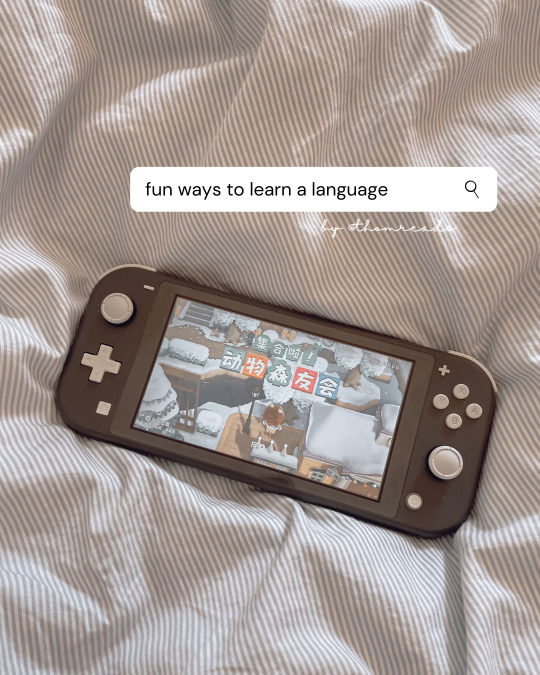
FUN WAYS TO LEARN A LANGUAGE📝☁️
[like for future reference/motivation]
learning a language can be a bit challenging sometimes, that’s why today i wanted to share with you few ways to have a fun learning experience instead of reading textbooks for hours.
1️⃣ video games: change the language of the games you like to play into your target language. for example, my favorite game to play in chinese and learn at the same time is animal crossing new horizons because it features useful and daily life vocabulary! (+that game is so calming i love it so much)
2️⃣ watch your favorite movie or tv show subbed or dubbed in your target language. the most efficient way would be to watch something you already know by heart but in your target language + the subs in your target language as well! this is what i call the winning combo! (if you are a beginner watch cartoons! can easily be found on yt or any other platforms depending on the language)
3️⃣ listen to music in your target language and try to sing along while reading the lyrics!
4️⃣ you probably spend a lot of time on your phone so why not change your phone language into your target language?
5️⃣ follow content creators that speak your target language: the best would be to find youtubers because you can listen to native people speaking, learn fun things with them but also relax at the same time! (now a lot of creators upload subtitles too)
HOPE IT HELPS! HAVE FUN LEARNING🙌🏻📝
more on my instagram account: thomreads
1K notes
·
View notes
Text
Cozy Mandarin Vocab List!

inspired by @malteseboy and this post
亲吻 - qīnwěn - kiss
电影 - diànyǐng - movie
偎抱 - wēibào - cuddles
毛衣 - máoyī -sweater
枕头 - zhěntou - pillow
咖啡 - kāfēi - coffee
袜子 - wàzi - socks
书 - shū - book
安慰 - ānwèi - comfort
毯子 - tǎnzi - blanket
小睡 - xiǎoshuì - nap
壁炉 - bìlú - fireplace
猫(咪) - māo(mī) -cat
暖意 - nuǎnyì - warmth
明星 - míngxīng - stars
查 - chá - tea
拥抱 - yǒngbào - hug
蜡烛 - làzhú - candle
柔软(的)- róuruǎn (de) - soft
娇嫩 (的)- jiāonèn (de) - delicate
甜蜜 (的)- tiánmì (de) - sweet
舒服 (的)- shūfú (de) - comfortable
暖和 (的)- nuǎnhuo (de) - warm
亲嘴 - qīnzuǐ - to kiss
抱抱 - bàobào -to hug
照料 - zhàoliào -to take care (of smb.)
躺下 - tǎngxià - to lie down
搂抱 - lǒubào - to cuddle / (依)偎 - (yī) wēi is also commonly used
读书 - dúshū - to read (a book)
睡觉 - shuìjiào - to sleep
休息 - xiūxí - to rest
keep in mind that most of those nouns can be used as verbs too and that i put different (cuter and more cuddly) words for verbs 🌺☕️📚
3K notes
·
View notes
Text
That Student Of Mandarin Language Feel
you understand all those words separately but not in that sentence
people asking you to “just say something in chinese, anything is fine!”
people asking you what’s their name in mandarin and you have to explain that you have no idea and then they get angry
having to remember all 7642 meanings of 点
you can read whole texts but get panic attacks when someone asks you to write
accidentally offending someone cuz u mispronounced the tone
accidentally saying 不有 instead of 没有 and your teacher looking at you like you just cursed their entire family three
having to explain that cantonese is a different language and that you do not, in fact, speak it
seeing a character with double/triple pronunciation and feeling like stabbing yourself
people asking you to translate other people’s badly done hanzi tattoos
3K notes
·
View notes
Text
◇ How to improve your knowledge in languages ◇
1 Don’t translate the new words, just use a dictionary, such as you do in your native language.
2 Rewatch movies - because now you can understand the movie, even if you don’t know exactly what are they saying
3 Read Wikipedia™
4 Talk alone
5 Learn your favorite songs and write their lyrics in a paper
6 Read a book or whatever
7 Watch recipes videos to learn food vocabulary
8 Force yourself to consume content even if is boring because you can’t understand what is happening
9 When you’re consuming some content, have an open tab with Google Translator - this makes the movie/book/video more dynamic and less boring
10 Tandem is a free app which allows you to practice your target languages with natives and this is awesome.
5K notes
·
View notes
Text
2+ Months of Language Learning Prompts!
Sometimes it can be tricky to know what to learn if you are teaching yourself a language. Here are some ideas for what you can focus on learning each day for the first two months of learning a new language! I formatted it so there is the general topic for the day and then in parentheses are some ideas to get you started but you can definitely learn a lot more than what I’ve written down! These are just to help generate some ideas!
This definitely would move pretty quickly if you covered all this material in 2 months so you could definitely spend more time on each topic if you need! This would require quite a bit of time each day in order to learn it all. This could totally work for a 4 or 6-month challenge where you spend 2 or 3 days on each of the topics I listed if you don’t have enough time to cover each topic in just one day!
Polite phrases (thank you, please, yes/no, you’re welcome, I’m sorry)
Introductory phrases (hi, my name is, I’m from, I speak, how are you?)
Pronouns (I, you, he, she, they, we)
Basic people vocab (girl, boy, man, woman, person, child)
Basic verbs in present tense (to eat, to drink, to walk, to read, to write, to say)
Sentence structure (how to form some basic sentences)
Negative sentences (I do not __)
Question words (who, what, where, when, why, how, how to form questions)
Numbers (0-20, 30, 40, 50, 100, 1,000, 1,000,000)
Time (hour, minute, half hour, reading the time)
Meals (breakfast, lunch, dinner, snack, dessert, appetizer)
Basic foods (apple, banana, rice, bread, pasta, carrot, soup, water)
More foods (beef, pork, fruit, vegetable, juice, coffee, tea, chocolate, cake)
Kitchen (stove, oven, kitchen, fridge, table, chair, bake, boil)
Eating supplies (knife, spoon, fork, plate, bowl, cup, glass)
More verbs (to make, to have, to see, to like, to go, to be able to, to want, to need)
Family (father, mother, son, daughter, aunt, uncle, cousin, grandmother, grandfather, parents, grandparents)
Transportation (car, train, plane, bus, bicycle, airport, train station)
City locations (apartment, building, restaurant, movie theater, market, hotel, bank)
Directions (north, south, east, west, right, left)
Adjectives (good, bad, smart, delicious, nice, fun)
More verbs (to give, to send, to wake up, to cry, to love, to hate, to laugh)
Colors (red, yellow, blue, green, purple, black, white, brown)
Emotions (happy, sad, calm, angry)
Physical descriptions (tall, short, blonde, brunette, redhead, eye color)
Body parts (arm, leg, hand, finger, foot, toe, face, eye, mouth, nose, ears)
Descriptors (rich, poor, beautiful, ugly, expensive, inexpensive)
Basic clothing (shirt, pants, dress, skirt, jacket, sweater, skirt, shorts)
Accessories (belt, hat, wallet, gloves, sunglasses, purse, watch)
More verbs (to keep, to smile, to run, to drive, to wear, to remember)
Animals (cat, dog, horse, cow, bear, pig, chicken, duck, fish)
More animals (turtle, sheep, fox, mouse, lion, deer)
Months (January, February, March, April, May, June, July, August, September, October, November, December)
Seasons (fall, winter, spring, summer)
Weather (sunny, cloudy, hot, cold, snowing, raining)
States of being (I’m hungry, I’m tired, I’m thirsty)
House (bedroom, living room, bathroom, stairs)
Furniture (bed, lamp, couch, door, window)
Electronics (phone, TV, computer, camera, radio, headphones)
Nature (tree, flower, plant, animal, grass, animal, outside, sky, sun, moon, clouds)
More verbs (to teach, to learn, to understand, to know, to listen, to hear)
School (classroom, elementary school, high school, college, student, class, grade, homework, test)
School subjects (math, science, English, art, music, chemistry, biology, physics)
School supplies (book, pencil, pen, paper, notebook, folder, backpack, calculator)
Classroom features (student desk, teacher desk, whiteboard, chalk, clock, bell)
Jobs (teacher, scientist, doctor, artist, dancer, musician)
More jobs (surgeon, manager, engineer, architect, lawyer, dentist, writer)
More verbs (to buy, to sell, to work, to ask, to answer, to dance, to leave, to come)
Comparisons (less than, more than, same, __er than)
Languages (French, German, Chinese, Russian, Spanish, English, Japanese)
Countries (France, Germany, China, Russia, Spain, Mexico, United States, Japan)
Religion (church, temple, mosque, to pray, Judaism, Christianity, Islam)
Past tense (I was, he ran, she wrote)
Hobbies (shopping, sports, soccer, chess, fishing, gardening, photography)
More verbs (to describe, to sleep, to find, to wish, to enter, to feel, to think)
Art (paint, draw, painting, gallery, frame, brush)
Morning routine (to wake up, to brush teeth, toothbrush, toothpaste, comb, soap)
Future tense (I will run, he will write)
TV + internet (online, internet, to watch TV, TV show, movie, documentary, cartoon)
More verbs (to look for, to stay, to touch, to meet, to show, to rent, to wash, to play)
7K notes
·
View notes
Text
Random idiom numero due 🤷🏻♀️

"Dove vivi?"
"Ah, vivo in culo ai lupi."
Lit. "Where do you live?" "Ah, I live in the wolves butt."
Now, I wish I had any idea as to who started saying this hahah, it's not the only saying that has to do with wolves too.
What this means basically is: I live in the middle of nowhere.
I can only guess that this "in the wolves butts" is based on the fact that wolves in Italy are generally found only up in the mountains where there are no people around, so it's technically "the middle of nowhere" 🤷🏻♀️
14 notes
·
View notes
Text
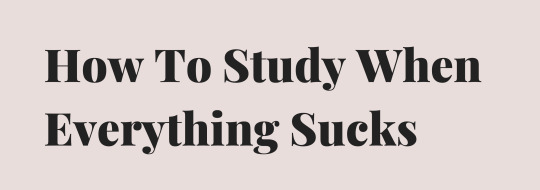
Hello, lovelies! I’ve gotten a couple of asks about studying so I decided to condense them into one post for you guys! I’m trying to hit a bunch of different topics so if you need an even more specific post you can send an ask! Without any further ado, have some tips! My studyblr is @spacey-scholar
Prep
First, you always need a good base for your day! Especially if you’re studying a lot.
Make a good full breakfast! Ex. Eggs and Toast, Smoothie and fruit, Pancakes and a cup of juice.
How’s your hygiene? Do you need to shower, brush your teeth, wash your face, condition your hair? Do it! You’ll be distracted if you feel messy!
Get dressed like it’s a normal day. Staying in PJ’s is okay! But being ready for the day seriously helps focus!
Likewise, your space should be clean. A clean space is a clean mind! Remove dishes, trash, scrap paper, and extra items. Wide down your desk, organize your pens and books. Your space should feel like your space!
Now make a list of what you need to get done! What needs to be done Now, what needs to be done Soon, and what needs to be done Later?
Order your list how you want your day to go, and don’t put super-tough subjects back to back, or subjects that are similar exercises i.e. reading thirty pages of two different books back to back is no fun.
The Studying
It’s important to buckle down with No Distractions! If you find yourself distracted put your phone away! If you need your phone, put it on Do Not Disturb until you’re done. I also do this at night for better sleep.
Pick the best technique for you, Pomodoro, reward-based, group studying, etc.
Play music but only if it will not distract you! If you sing along or daydream it’s the wrong music! Classical, Lo-fi, and White noise are all good! My Spotify Here has some good ones.
Use a nice journal (I don’t mean expensive!) and pens/pencils you enjoy using. I like to have a specific journal and color dedicated to each subject.
Take notes on recorded lectures and classes, if you’re doing online classes right now try to screen record or record the audio! That way if you space out you can play it later and take notes, and you can absorb the lesson better instead of being distracted.
Don’t worry about your notes, stationary, pictures, being beautiful and your grades being perfect. Life doesn’t always look the way it does on Instagram. And the people who spend hours trying to get a good photo of their coffee are not studying!
Use flashcards! Quizlet is good if you need premade ones! If you can save up and buy them, Barrons AP Flash Cards are the best in my opinion. Very clean, not too long, very durable, and cover all subjects.
Feeling Distracted
If you catch yourself drifting off and getting into your head, get up and take a quick walk, stretch, or energizer.
It’s okay if this happens, don’t guilt yourself! practice affirmation. The best and smartest still get distracted.
If you are drifting, why? Are you hungry? Tired? Thirsty? Bored? Get a snack and some water, take a break and rest, find a way to make your studying more enjoyable.
Remember that Motivation and Discipline are different things. Sometimes we just won’t be motivated, we won’t want to do it and it will be rather frustrating. But the cure to this is not shaming its discipline. Remind yourself “This may be hard, and I may not want to do this, but I want to reach my goals and If this is what It takes I will make it happen.
Always do just one more page of you’re tired. One at a time and oh you did it! Maybe just one more? One more? Eh, one more just to finish the train of thought, Oh just- I’m done? Nice!
If you really can’t focus just move on and come back to this subject, you can always ask for help.
Supplementary Things
There are so many apps you can use to study, for free! My favorites are Tide, Quizlet, Focus Keeper, Forest, Flora, Egenda, SpanishDict, Photomath, and Kahn Academy.
You can also join a study group! You may know one, but if you don’t, there are a lot of online ones! I’m in a study Discord and have been for a while! it helps a lot and motivates me to finish my work!
You can make a studyblr, but don’t do it just for the aesthetics! It’s about studying, and sometimes that gets messy! Sometimes we fail a test, we spill our tea on our notes, we cry because we don’t understand the formula. That’s the part you don’t see!
Having cute stationery can really help, as well as nice organizers and decorations for your space! I don’t have much money so I get a lot of stuff on Amazon or FB Marketplace.
Health
Remember that no matter what you are good enough. It’s okay if you fail, it’s okay if you struggle.
It’s also okay if your path doesn’t go the way you expected! Maybe you go to a different school than expected! Or choose a trade instead! Maybe you take a gap year! Maybe your passion changes! Maybe it changes six times!
Your health is always more important than your school. If you are in pain, mentally or physically, if you are anxious, exhausted, burnt out, talk to your teachers about it! You matter more than a grade.
Your best is good enough! And your best doesn’t look the same as someone else’s best! Don’t compare!
Now go get out there and study!
17K notes
·
View notes
Text
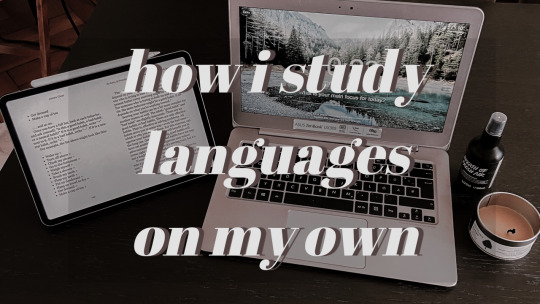
click here for my new video! i’m sharing some language learning study tips that i use to self-study languages at home, featuring apps, websites, podcasts and books that i really enjoy using!! hopefully this will be helpful and inspire some of you :) if you enjoy my videos, please leave a like/sub, that would be so appreciated!!
11K notes
·
View notes
Text
The online Japanese course that no one talks about
Okay so I’m not a langblr and I never plan to be. However. What I do know from following a ton of them is that no one talks about Minato.
Now you may be thinking, ‘What’s Minato?’. It’s a website that was recommended to me by a Japanese Studies university professor for learning Japanse at home.
It’s literally the best resource out there and it’s free (funded by the Japanese government). You can choose between self-study and tutor support-led courses.
There are courses in Hiragana, Katakana, and the general language (from levels A1 to A2), and you can download a certificate and study record after completion of a course.
Here’s the link. Or if you want to type it: https://minato-jf.jp
Go. Learn some actual Japanese.
24K notes
·
View notes
Text
From Beginner to Intermediate: an intense plan for advancing in language
Introduction
I studied Spanish at school for 3 years and now I'm at a low B1 level. I can actually understand pretty well while listening or reading but I can't communicate fluently.
This plan will include vocabulary build up, some grammar revision, a lot of listening, reading and writing. And could be used for the most languages, not only Spanish.
Plan
Every day:
Conjugate one verb in present, past and future tenses
Make a list about 10 - 30 words long
Create flashcards with them and start learning them (I use Quizlet for flashcards)
Revise yesterday's set of flashcards
2-3 times a week:
Read an article or a few pages from a book
Write a few sentences about anything in your target language
Listen to one episode of podcast (at least one)
Once a week or every two weeks:
Watch a movie in your target language, preferably animated movie as the language used there is easier. You can watch with subtitles
Grammar exercises
Translate some short text
Once a month:
Write something longer, like an essay or report, on chosen topic
Additionally:
Talk to yourself, to your friends, to your pets
Text with someone
Look at the transcription while listening to the podcast for second time
Repeat what you hear (in podcast or movie)
Check words you don't know from the listening and reading
Read out loud
Listen to music in your target language - you can even learn the text and sing along
Watch YouTube in your target language
Change your phone language to the one you're learning
Think in you target language!!!
***This is very intense plan for self-learners, you don't have to do all of these things in the given time. Adjust it to your own pace. I'll try to stick to this, if I have enough time.***
10K notes
·
View notes





